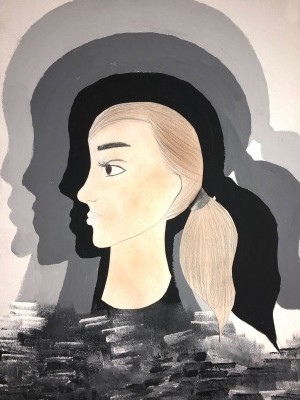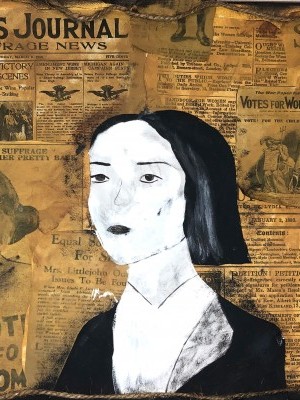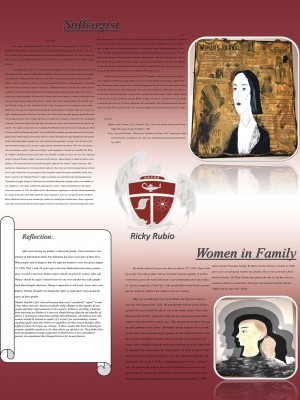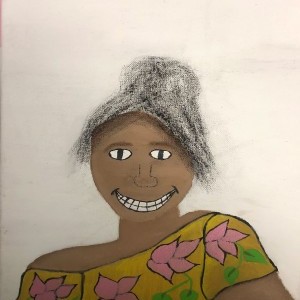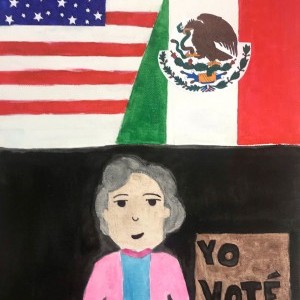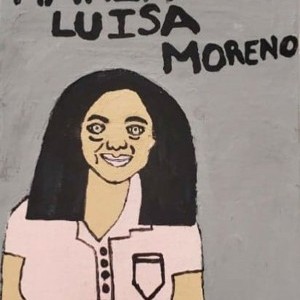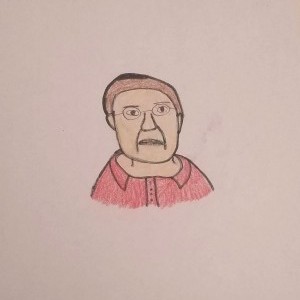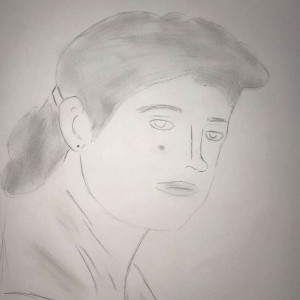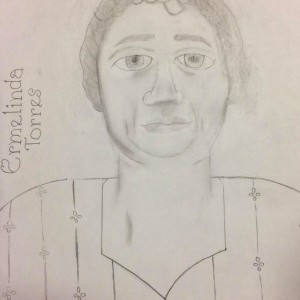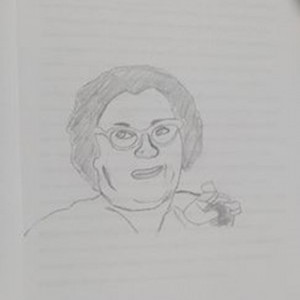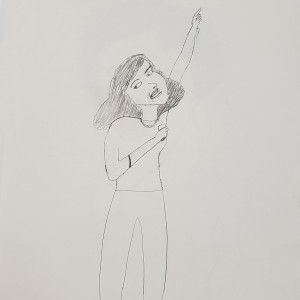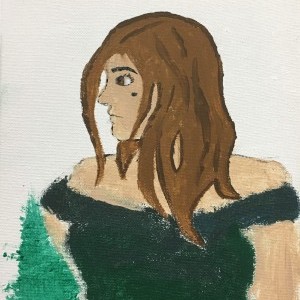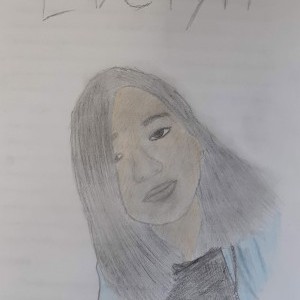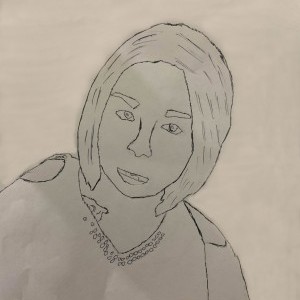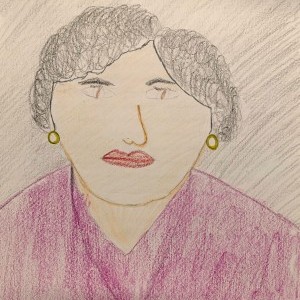Ricky Rubio
García Early College High School | Laredo, TX | 10th Grade
Inspirational Family Member
My Mother
My Mother Karen Picasso was born on March 23rd, 1983. Since birth my mother has always taken interest in politics and the equality of women everywhere across the world. My mom’s side of the family grew up in Mexico City for a majority of their life. My grandmother would always encourage my mother to embrace her right to vote as a woman.
When my Grandmother grew up in Mexico the right for women to vote was only granted after 1953. My grandmother told me stories of how grateful she was to finally be able to vote in her home country. She would always tell my mother “appreciate what you have, mija, many women have fought to have the rights you have now.” This inspired my mother to become an active feminist in her school. My mother always wanted to be in a community where she can speak out for equality and the rights of women. At the age of twelve my mother moved to America with the rest of her family of course. After moving to Texas my mom was transferred to a new school with a completely new environment she wasn’t used to. In Texas my mom’s love for feminism grew. During her history class she would learn about the way suffragettes like Susan B. Anthony held gatherings for women’s rights to vote. My grandmother told me how excited my mother was to vote at the age of eighteen. By the time my mother Karen Picasso turned eighteen years old the presidential election had already been held in November 7, 2000 where President George W. Bush won the election. Finally, in 2004 after years of waiting my mother was finally able to vote at her first presidential election. My Mom told me how proud she was to cast her vote as a woman in America. I asked her what types of emotions she felt, and she simply told me one word “pride”.
Historical Figure I Admire
Lucy Stone
Lucy Stone, abolitionist and woman’s rights activist was born on August 13, 1818, in West Brookfield, Massachusetts. She has always strived to battle inequality on all fronts. Lucy was never afraid to defy gender norms placed upon women and she definitely didn’t let society change her mind. She was a fierce public speaker that spoke about injustices on behalf of women’s rights no matter what.
Since birth Lucy Stone was always interested in rights for women. She was the daughter of her father, Francis Stone and her mother, Hannah Matthews. Lucy grew up in a farm with her two parents, throughout her childhood, in Massachusetts. Lucy Stone was of the Congregationalist faith and took her father’s stance on antislavery. However, she distanced herself from the Congregationalist Church after her church leaders started to criticize women for “unfeminine behavior” because they spoke to mixed audiences. Despite her family that hardly encouraged her schooling especially college, Lucy still aspired to get a higher education. She started to work in order to save money to attend college after securing a teaching position despite being sixteen. Finally, after saving enough money she was able to attend Oberlin College in 1843. Although Oberlin College was progressive by letting men and women attend, Lucy was still restricted from showcasing her full potential as a student. Stone grew an interest in public speaking and discovered her true talent. Lucy Stone's talent in public speaking gained the attention of the administration at her college that they even asked her to compose a speech for their graduation ceremony. Stone later refused this offer after she was made aware that a man would present the speech and not her.
Years after college Stone was recognized by William Lloyd Garrison and eventually got hired to be part of his abolitionist movement. Lucy would deliver multiple speeches and would even receive physical and verbal attacks just because she was a woman that spoke her mind. During this time period women delivering public speeches was still considered unacceptable to society. Lucy did not let this stop her from speaking out on women’s rights and the abolitionist movement. This shows the dedication Stone had for women’s rights, no mob big or small stopped her. Despite not attending The Women’s Rights Convention in Seneca Falls, Stone was still able to speak out in her own way.
She organized the first National Women’s Right Convention in Worchester, Massachusetts to speak out about issues publicly. This convention drew thousands of people to fight for the women’s rights movement. This marked new beginnings for civil and political rights for those that were discriminated against because of their sex or color. Issues that were presented at the convention raised awareness around the world. Lucy Stone’s speech at the National Women’s Rights Convention was reprinted in the international press. Thousands of people disagreed with Stone but with those thousands of people came a vast number of new supporters. Lucy Stone continued to advocate for women’s rights and feminism as she toured across the country. In 1851, she addressed the Massachusetts legislature at the State House demanding for women to be given civil rights under the state constitution. Later on, she met her future husband Henry Blackwell and set a new standard for women by retaining her maiden name. Henry supported Lucy and even promised her to protest against restrictive marriage laws. Women that kept their maiden name were known to be “Lucy Stoners” since then. In New Jersey, Stone gave birth to her two children but only her daughter Alice Stone Blackwell survived. Lucy Stone continued to advocate for women and civil rights while leading associations like The New Jersey Women Suffrage Association. Stone spoke with other suffragists like Susan B, Anthony and Elizabeth Cady Stanton over the 14th and 15th amendments that gave voting rights for black men but not women. Although it did upset her, she was fine with this because of her abolitionist’s goals. Stone was also a founder of The American Suffrage Association and began publishing journals to the public outside of their offices. Lucy gave her last speech in 1893 and did not live to see women have the right to vote.
Despite not living to see the passage of the 19th Amendment that granted women the right to vote on August 18, 1920 it was undeniable to see Lucy Stone’s impact on the woman’s rights movement. What people tend to forget is how incredibly dangerous it was for women to even speak out during this time period. It was only until the late 19th century that courageous women like Lucy Stone addressed issues about inequality for women. Stone contributed towards woman’s rights with her speeches like the one she gave in the first National Women’s Rights Convention. Lucy Stone was a role model to many and paved the way for future suffragists like her daughter. She inspired thousands of people every step along the way which is why she’s a prominent figure for the advocation of women’s rights.
SOURCES +
What the Project Means to Me
After interviewing my mother’s side of the family, I have learned a vast amount of information about how feminism has been a key part of their lives. What people tend to forget is that the right for women to vote was given August 18, 1920. That’s only nearly 100 years ago to be exact. Think about how many generations it took for this basic human right to finally be given to women. Men and Women should be equal, it should never be one over another but sadly people back then thought otherwise. Voting is important on all levels: local, state, and federal. Women shouldn’t be denied the rights to make their voices heard because of their gender.
Women shouldn’t feel silenced because they aren’t considered “equal” to men. It has taken years for America to finally make changes in the equality of our people and their representation in this country. If there is anything I learned from interviewing my Mother it is that you should always fight for the equality of others. I’m proud to come from a family full of feminists who believe men and women should be treated as equals. If it weren’t for extraordinary women standing up for what they believe in, regardless of what society thought, there might not have ever been any change. It is these women that have inspired generations of public speakers to do what others are afraid to do. They spoke their mind and gathered enough supporters to finally have a new amendment passed. An amendment that changed history for women forever.
Explore the Archive
More From This Class
Click on the thumbnails below to view each student's work.Deadline Extended
There's still time to join Women Leading the Way.
Become a part of our storytelling archive. Enroll your class today.
Join the Project

